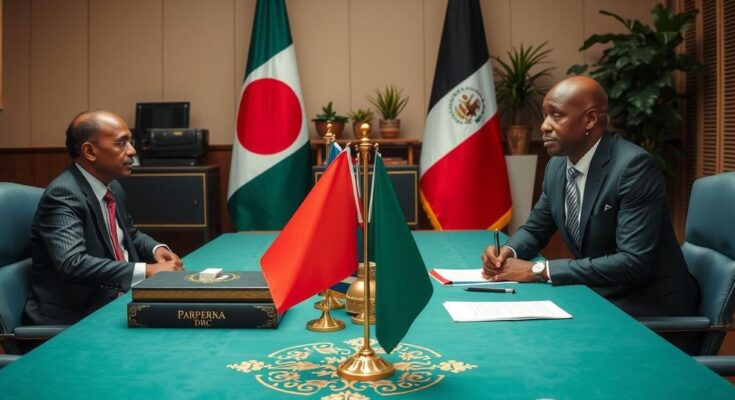The DRC summoned Uganda’s Acting Chargé d’Affaires to clarify remarks by General Muhoozi Kainerugaba regarding foreign mercenaries in eastern DRC. The controversy stems from Kainerugaba’s posts threatening action against these mercenaries. Despite attempts for peaceful dialogue, relations between the DRC and Uganda remain tense amid regional conflicts involving Rwanda.
On December 18, 2024, in Kinshasa, the Democratic Republic of Congo (DRC) summoned Mr. Matata Twaha Magara, Uganda’s Acting Chargé d’Affaires, to seek clarification regarding recent statements made by General Muhoozi Kainerugaba, the Commander-in-Chief of the Ugandan Defense Forces. This meeting, initiated by Minister of State for Foreign Affairs Thérèse Kayikwamba Wagner, arose from General Kainerugaba’s posts on X (formerly Twitter) that contained a warning directed at foreign mercenaries allegedly operating in eastern DRC.
Among the statements, one controversial post from December 16 noted, “I’m going to give only ONE WARNING to ALL white mercenaries operating in eastern DRC. From 2nd January 2025, we will attack all mercenaries in our area of operations.” He emphasized a strong aim to eliminate these foreign operatives by stating, “In the name of Jesus Christ, the God of all Bachwezi, there shall not be left one white mercenary in DRC this time next year!” These remarks were perceived as possibly targeting foreign operatives linked to the Agemira group from Bulgaria and RALF from Romania who have been engaged in supporting the Congolese national army in combating the M23 rebels since 2022.
The DRC government has continually asserted that these individuals are trainers, not mercenaries, and are there to enhance the capabilities of the Congolese Armed Forces (FARDC). Consequently, in a formal statement, the DRC Ministry of Foreign Affairs demanded an official clarification regarding the implications of General Kainerugaba’s comments and the current state of relations between Uganda and the DRC. General Kainerugaba later expressed his intent to promote peace, mentioning, “I shall visit my big brother (President Tshisekedi) in Kinshasa soon.” This remark highlights his ongoing diplomatic efforts in the region, having previously engaged with other leaders such as Rwanda’s Paul Kagame and Ethiopian Prime Minister Ahmed Abiy.
Despite this conciliatory posture, the DRC insists on obtaining a formal response from the Ugandan authorities. The situation remains tense, exacerbated by recent allegations from Rwanda accusing the DRC of deploying mercenaries to destabilize Kigali, a claim that Kinshasa vehemently denies. Instead, the Congolese government points to Rwanda’s alleged backing of the M23 rebels as the root of ongoing instability in the eastern region. Observers note that these tensions may severely impact the already fragile relations between the two nations.
The Democratic Republic of Congo has been facing complex regional challenges, particularly in its eastern territories where various armed groups, including the M23 rebel group, operate. The presence of foreign mercenaries in these conflicts has raised concerns among regional governments. Recent remarks by the Ugandan General have heightened tensions, given the historical strains between the DRC and Uganda, particularly stemming from accusations of support for insurgents and other violations.
In conclusion, the DRC’s summoning of Uganda’s envoy underscores rising diplomatic tensions fueled by recent statements from General Muhoozi Kainerugaba regarding foreign mercenaries in eastern DRC. While efforts toward peace and diplomacy are being expressed, the underlying issues, including allegations of destabilization and foreign involvement in the ongoing conflict, remain contentious and threaten the fragile relations between the two neighboring countries.
Original Source: chimpreports.com




